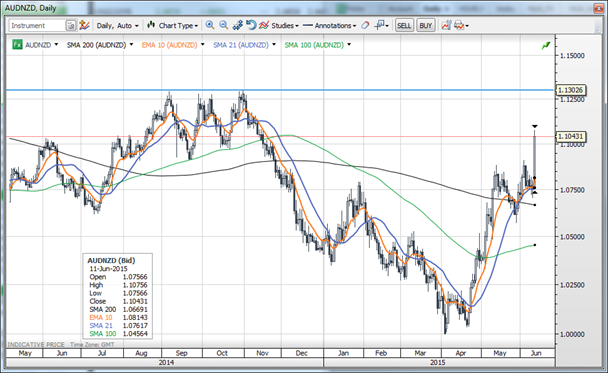The Reserve Bank of New Zealand cut rates as only a minority of those surveyed expected and the bank issued a roundly dovish statement pointing to risks of further downside to income and demand growth from weak milk prices, as well as low inflation.
The statement also suggested that the risks of a housing bubble in Auckland would be addressed with macroprudential measures. On the exchange rate, the statement said that “A further significant downward adjustment is justified. In light of the forecast deterioration in the current account balance, such an exchange rate adjustment is needed to put New Zealand’s net external position on a more sustainable path.”
Finally, in case we weren’t all on the same page with the RBNZ’s intentions: “We expect further easing may be appropriate.”
EURCHF is pushing up at the 1.0500+ resistance despite the lack of any real fresh news on Greece. The latest this morning is from the EU’s Moscovici “differences have narrowed on Greece”. It is interesting that EURUSD failed to sell off yesterday despite the strong rebound in risk appetite as European sovereign bonds also finally found some support. Are bears reluctant to pile into fresh euro shorts due to the near term risk of a deal on Greece?
Today’s US retail sales data is the most important data point until next Wednesday’s FOMC meeting. Last month’s reading saw a disappointingly small rise and only one of the last five readings has been decidedly strong, so another disappointment is going to draw out the suspense on whether the US economy is bouncing back after the Q1 disappointment.
Chart: AUDNZD
The Kiwi pounded for new losses across the board on the RBNZ move overnight. Given the interest rate spreads (2-years), they are at their highest level since early 2014, so this RBNZ move may offer support for a move toward at least the old 1.1300 area that was resistance last year.

The G-10 rundown
USD: May be reactive to today’s data, particularly if we surprise to the upside. Federal Open Market Committee meeting up next Wednesday.
EUR: Greece, Greece, Greece – unfortunately, as ad hoc headines make for sloppy moves – eventually looking for EURUSD downside and EURCHF upside.
JPY: Are Kuroda comments enough to scotch the yen sell-off? Not so sure that they are if we get strong US data and an upgrade to Fed expectations after next week’s. Of course, the risk is two way and the bulls will have to fold if USDJPY is crushed back through 122.00/121.50.
GBP: Sterling looks overambitious with yesterday’s test of the 200-day moving average in GBPUSD (just under 1.5500), but let’s see if the USD can get any traction versus the pound after the Retail Sales release later.
CHF: given EURCHF upside, EURUSD downside view longer term (expecting an imminent deal on Greece), this means USDCHF is potentially the “turbo mover”. We prefer owning some optionality in CHF downside.
AUD: A strong employment report, but these reports are unreliable and swing wildly from one month to the next, so tough to draw conclusions from them. While AUDNZD upside may remain an interesting trade, the AUDUSD bears may yet have a case if we see strong US data today.
NZD: pounded lower on the RBNZ cut and dovish guidance – looking lower for NZD, but a key question remains trade selection as the USD outlook is unclear at the moment. AUDNZD upside is an alternative way to express NZD downside.
SEK: Watching today’s CPI – Riksbank obsessing on inflation issue (would say they are watching it like a hawk – but certainly the wrong metaphor…they are extremely dovish…) EURSEK mid-range.
NOK: NOK getting very little upside from strong oil prices – suggesting underlying weakness and further risk of downside if wily Norges Bank is dovish next week.
Economic Data Highlights
- New Zealand RBNZ cut rates 25 basis points to 3.25% vs. majority expectations for no rate cut.
- UK May RICS House Price Balance out at 34% vs. 36% expected and 32% in Apr.
- Australia May Employment Change out at +42k vs. +15k expected and vs. -13.7k in Apr.
- Australia Unemployment Rate out at 6.0% vs. 6.2% expected and 6.1% in Apr.
Upcoming Economic Calendar Highlights (all times GMT)
- Sweden May Average House Prices (0730)
- Sweden May CPI (0730)
- US May Retail Sales (1230)
- Canada Apr. New Housing Price Index (1230)
- US Weekly Initial Jobless Claims (1230)
- New Zealand May Business NZ Manufacturing PMI (2230)
